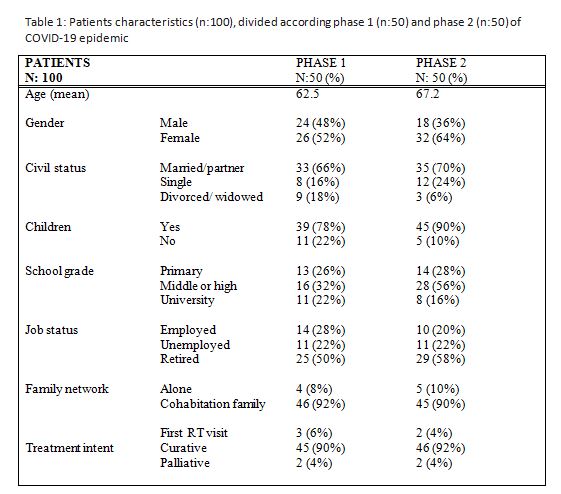COVID-19 pandemic impact on psychological state and care of cancer patients undergoing radiotherapy
Lucrezia Gasparini,
Italy
PO-1049
Abstract
COVID-19 pandemic impact on psychological state and care of cancer patients undergoing radiotherapy
Authors: Lucrezia Gasparini1, Luciana Caravatta1, Maria Taraborrelli1, Marzia Borgia1, Domenico Genovesi1,2
1SS. Annunziata Hospital, Radiation Oncology Unit, Chieti, Italy; 2G. D'Annunzio University, Department of Neuroscience, Imaging and Clinical Sciences, Chieti, Italy
Show Affiliations
Hide Affiliations
Purpose or Objective
Since the
outbreak of COVID-19 disease, oncologic patients were identified as subjects at
risk of developing serious complications during pandemic. The dangerousness of
the disease and the restrictive measures can both be a cause for concern and
anxiety among population, and their impact on cancer patients, could be even
greater. This study aimed to
investigate the psychological state of cancer patients in our Institute.
Material and Methods
From April 15th 2020 to May 30th
2020 all patients attending our Unit were invited to answer a self-administered
questionnaire, as promoted by AIOM . Fifty-three anonymous questions were set
to evaluate the participants’ risk perception of COVID-19 and their
psychological status. In addition to demographic characteristics, the
questionnaire investigated 5 different domain: provided information about COVID,
mood, social relationships, medical history and perceived safety. Descriptive analysis was performed, in collaboration
with psycho-oncologist. The patients
were also divided in 2 groups, according to phase 1 (50 patients) and phase 2
(50 patients) of the pandemic.
Results
Demographic characteristics are shown in Table 1. A total of 100
questionnaires were distributed Provided information about COVID: The
42% of patients received satisfactory information about COVID from traditional
and social media. In addition, the family doctor (37%) or the radiotherapist (14%)
were contacted. Mood: Anxiety and concern were prevalent in the 53% of
patients. Sadness, sense of impotence or vulnerability were reported in the
20%. The 26% felt calm or indifferent. Infection of family members and/or
themselves (34%), future economic situation (10%), interruption of oncologic
cares (4%) were the main concerns. Anger for political choices was reported in
the 8%. Social relationships: A modification in daily life was perceived
in the 31%, due to restrictive measures and less familiar contacts. Nevertheless,
interpersonal relationships did not modified in the 75% of cases, despite the
distance. The 60% was satisfied by quality of life, and the 54% enjoyed daily
activity. Medical history: Previous psychological disorders were found
in 9 patients. Their impact on risk perception was negligible: 1% contacted the
psychologist or needed drugs adjustment to face the crisis, 0% considered
suicide. The 3% of patients increased smoke, food and alcohol habits. Perceived
safety: The 40% did not postponed visits or exams during this period. The 30%
considered the RT Unit a safe place. No significant differences were found
between the 2 groups, so all the results were considered together.

Conclusion
Our analysis showed that, during the COVID-19 epidemic, oncologic
patients were worried about the risks of infection, but protective measures by
our Institute resulted adequate to limit
psychological distress and guarantee a good quality of life. Further actions
should be taken to improve sense of security in our Unit.